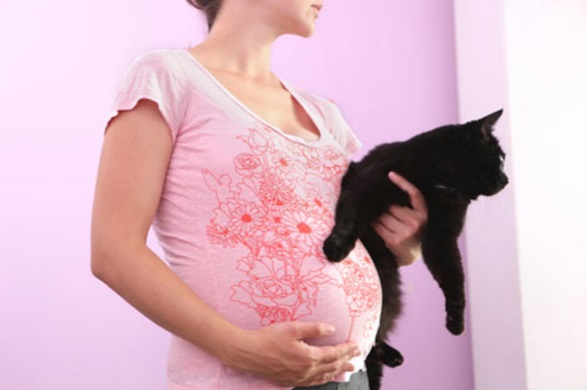Cats are known to be sensitive and have a sharply developed sense of smell, hearing and sight. But can cats sense pregnancy? Your darling cat will probably sulk once your baby arrives and it realizes that it isn’t the baby in the house any more, but even long before that, your cat can sense the changes in your body, particularly your belly as it grows and your changing body language.
Can cats sense pregnancy?
Yes, it is believed that cats can sense pregnancy. Animals have sharp sensors that are quite more enhanced than our senses. They can detect vapors and smells that people are not even aware of. Being quite sensitive, most cats are able to sense the pheromones produced by your body because of your pregnancy. You may observe a change in your cat’s behavior as the pregnancy moves on. Even if your cat has always been more of the rambunctious kind, it may start acting more peacefully around you and be more loving and affectionate.
Cats tend to be very loving creatures, eager to nurture and cuddle one of their own. When sensing the pregnancy of their owner, a cat may be intuitive in mothering and become protective and loving of the pregnant mother, and even the fetus in the womb. A cat in tune with its owner may sense the pheromones and notice the weight gain in the belly region, similar to the swell of a mother cat’s belly. A truly intuitive cat may feel the need to keep the baby safe and warm by lying on the mother’s belly. Your favorite cat may also wish to cuddle you more to ensue you are safe, loved, and happy.
In an extreme case, your cat may become jealous of the pregnancy, and sense that their place in the household will be shifted. A cat that is jealous may become withdrawn and uninterested. S/he may also become disruptive or poorly behaved to show displeasure in the pregnancy, or the new baby. Be sure to offer plenty of attention to your cat during the pregnancy to help lower his/her potential stress levels and to ensure your cat will remain an important part of your day.
Cats are smart
You may have come across stories in which people talk about changes in their cat’s behavior when the owner is pregnant. In one such story that I read, the cat changed its behavior towards its owner even before she knew about her own pregnancy. This can lead to the conclusion that cats do not sense pregnancy only due to behavioral or physical changes in their owners.
Cats have an intuition that humans do not. Women that become pregnant undergo a lot of hormone changes that are not noticed by a human for around a month, or perhaps even longer. An intuitive cat that relies on their senses should be able to pick up on the hormone change the lady of the house is emitting.
Soon after conception, before the mother relies a pregnancy has taken place; the human body begins to prepare for the growth of the human. In preparation, the body alters its chemical makeup to allow for a successful pregnancy, and the change of hormones can emit a scent that very few can pick up on. The sense of smell a cat has will allow him/her the advanced warning that a pregnancy may be taking place.
Your cat may be different
There is also the possibility that your cat remains completely unresponsive towards your pregnancy and may choose to ignore it. Other cats become possessive and exhibit jealousy. However, most cats have been seen curling up right next to the mom-to-be, enjoying the warmth and feeling the vibrations in her stomach. Cats are also known to become increasingly protective about their owners. This is the time that you must accept your felines love and pamper it with a lot of affection so that your cat understands that she will remain precious for you forever.
If you notice your cat has become unresponsive to the pregnancy, or is behaving in an unusual way, you may wish to offer your cat a bit more attention than usual, and perhaps give your cat a welcome gift of a cat tree, a new laser pointer, or a healthy treat. Be sure to not disrupt the household too much and cause undue stress upon your cat, which will only compound the jealousy and create a toxic environment.
Your cat-routines
Cats love routines, and it is important that you maintain yours with your cat. As you move ahead in your pregnancy, you must ensure that to whatever extent possible, you stick to your care-giving routine for your cat. The daily feeding, weekly brushing, playtimes and cuddling times should be the same during pregnancy and after the baby arrives. During the days when you are unable to do these, ask a family member or friend to step in and help your cat maintain its routine. This will help your cat to continue being affectionate through the pregnancy and beyond.
Your jealous cat
Your cat may remain very affectionate all through your pregnancy yet react in completely the opposite manner once the baby comes home. Don’t be too surprised if this happens! The reason is very simple to understand. Because your cat is used to being pampered by everyone in the house and being the baby, she sees your newly born as competition. With continued attention from you and other family members, she is likely to settle down soon. And you don’t need to fret about your baby’s safety as your cat is quite unlikely to be aggressive towards him or her. Cats are gentle creatures and yours will soon adapt to sharing your attention.
When to get professional help
Your cat may start behaving very badly during your pregnancy. There is also the possibility that your cat is one of the few that are unable to adapt to sharing you with your newly born. If you are unable to prepare your cat for the new baby, it would be advisable to consult your veterinarian or a professional trainer. Readiness for a baby can be learnt at special classes offered by trained pet handlers.
A few precautions
There are a few precautions that you must take as an expecting mother to manage the possibility of acquiring toxoplasmosis that is a parasite which may be transferred from cat stools. While changing and cleaning your cat’s food bowls and litter boxes, you must always wear a surgical mask and gloves. It would be advisable to assign this job to another member of the family until you are nursing the baby.
You may be among the 40% women who are immune to toxoplasmosis, in which case you are not at risk at all. Cats that live only indoors and eat prepared foods don’t transmit this illness in any case. In case you do acquire the infection, it can be treated successfully with medication.
Your baby and your cat
Once your baby starts crawling, the cat and the baby are both likely to have a lot of fun playing together. However, until your child is at least seven years old, you must supervise their playing activities at all times. This may be a bit of a challenge, but you can devise suitable strategies to manage them both. With some careful planning and a few precautions, your baby and cat will learn to co-exist, not cause much discord and may in fact become the best of playmates!
Conclusion
Can cats sense pregnancy? Yes, but having a cat during and after a pregnancy is probably one of the best things for you and the baby. This is because research has shown that having a pet and spending time with it can decrease depression, improve your mood, decrease blood pressure and ultimately help you live a longer, healthier and happier life!
References:
http://www.whattoexpect.com/forums/march-2010-babies/topic/can-your-cat-smell-your-pregnancy.html
http://www.cancats.net/can-cats-sense-pregnancy/
http://babyandbump.momtastic.com/trying-to-conceive/856615-do-cats-sense-your-pregnant.html
http://pets.thenest.com/cats-pregnant-8985.html
https://upvoted.com/2015/12/07/can-pet-dogs-and-cats-detect-pregnancy-in-humans/
http://www.babycenter.com/404_can-pets-sense-pregnancy_1379572.bc









Leave a Comment